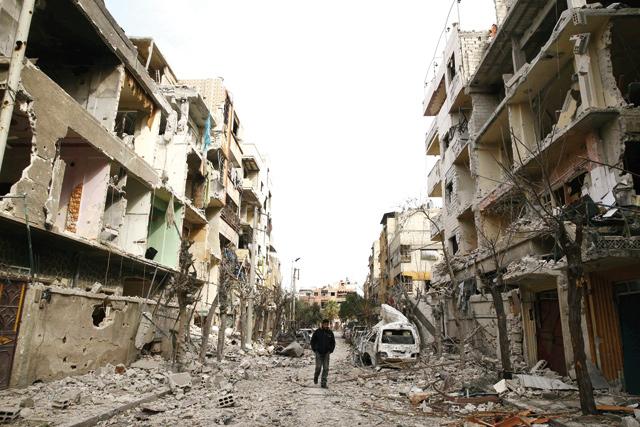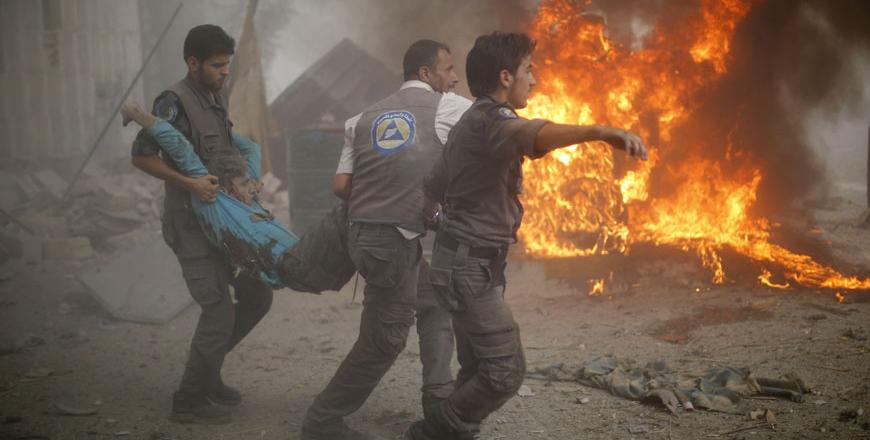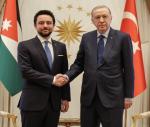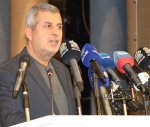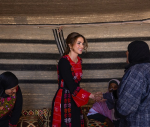You are here
As diplomats meet on Syria, war moves into higher gear
By Reuters - Aug 20,2015 - Last updated at Aug 20,2015

A Syrian youth runs past bloodstains and debris following air strikes by government forces on the rebel-held town of Douma on Thursday (AFP photo)
BEIRUT — A marked escalation in Syria's conflict including intensified fighting near Damascus this month could be a sign the warring sides are trying to strengthen their bargaining positions in case a flurry of diplomacy leads to negotiations.
The high-level talks involving rival states with a stake in the war face formidable obstacles, not least the seemingly insurmountable division over President Bashar Assad's future in a nation shattered by more than four years of war.
But even with the bleak outlook, some believe escalation points to the possibility of a new phase negotiated by the United States, Turkey, Saudi Arabia, Iran and Russia, which all wield influence over the parties in Syria's war.
"It is still fragile, but it is the most concerted move yet to find a political solution. Everyone needs a political solution. Everyone is exhausted," a Western diplomat tracking the conflict said. "There has been a flurry of military activity to prepare for a political solution."
The pace of the war first accelerated in March, with rebels supported by states including Saudi Arabia and Turkey making significant gains against depleted government forces that have received crucial backing from Iran and Lebanon's Hizbollah.
After a lull, the war has shifted into an even higher gear since early August, coinciding with the start of diplomatic activity that followed the conclusion of Iran's breakthrough nuclear deal with world powers including the United States.
Rebel groups, seeking to crank up pressure on Assad, have begun new offensives in areas seen as vital to his survival, including his seat of power in Damascus and the coastal heartland of his Alawite sect.
This month, rebels have launched two assaults near Damascus — in Harasta to the northeast and in Daraya to the southwest. They have also fired rockets into the coastal city of Latakia, which has been spared the worst of the war, and redoubled a bid to drive remaining government forces from Deraa in the south.
Insurgent attacks, government air strikes
Iyad Shamse, head of the Asala and Tanmieh Front rebel group, said: “The last month was very different from all the previous months of the revolution: strong pressure on the regime to make it submit to a solution, militarily or politically.”
“When the opposition has a strong position on the ground, it will be able to impose its conditions,” he told Reuters.
“There were good results... but it is clear the regime also had a big escalation. It committed big massacres.”
The government has hit back with air strikes against which the rebels remain mostly defenceless. More than 100 people were killed in an air strike that hit a marketplace in the Damascus suburb of Douma on Sunday — an attack described as a war crime by a senior UN official.
The air strikes have continued in Douma and rebel-held areas nearby, where rescue workers of the civil defence say a total of 180 people were killed in bombardments this week.
The air force continues to give Assad a vital advantage over his enemies even with the army facing a manpower problem.
The Syrian military believes the escalation, including deadly rocket attacks on Damascus, is aimed at thwarting diplomatic initiatives being promoted by Iran and Russia, Assad’s other most important ally, a military official said.
“It seems that didn’t suit Saudi desires, so the [rebels] began to become active in all places,” he said. “The leaders of the armed group have started to be more active, as if there is a certain plan... to put pressure on the city of Damascus.
“If there is any escalation towards Damascus there will be a decisive response.”
Assad and Hizbollah have meanwhile redoubled their campaign to take Zabadani at the Lebanese border, where a truce concluded earlier this month gave brief cause for hope before collapsing.
Government forces have also increased efforts to retake areas of the northwest vital to the defence of the Alawite mountains and the city of Hama — and Assad’s survival.
“The escalation is an attempt to improve the conditions for negotiations between the parties and the regional powers. The regional powers are trying to support the parties with all their might,” said Rami Abdulrahman, director of the UK-based Syrian Observatory for Human Rights organisation that tracks the war.
Daesh
In parallel, the Daesh terror group that controls more of Syria than any other insurgent faction has stepped up its attacks, staging a westward thrust towards government-held areas in central Syria and rebel-held parts of the north.
Its advance north of Aleppo appears to be a pre-emptive strike on rebels who are likely to join with the United States and Turkey in a new front against Daesh near the Turkish border.
“Everyone is preparing for a new phase. Though the parameters have not really emerged yet, Daesh knows that somehow the new phase is going to be directed against them,” the diplomat said.
Diplomats say Russia and Iran are the prime movers behind the latest political thrust, which faces big obstacles.
Russia’s idea is to bring Damascus into a broad coalition against Daesh that would also include Assad’s foes in Turkey and Saudi Arabia, which say the Syrian leader can have no role in the future of his shattered country.
Iran has said it will soon present the United Nations with a peace plan based on a four-point initiative that includes an immediate ceasefire. A senior Russian diplomat said on Wednesday that “de facto” everybody was now discussing Daesh, and leaving Assad for later — something the Russians are happy with.
Russia has said it won’t accept any deal that predetermines Assad’s future by requiring him to quit power. It says Damascus and the opposition must work out Assad’s future together.
Yet any initiative that does not secure Assad’s departure looks impossible sell to Syrians who have been fighting to topple him since 2011, a conflagration that has killed about 250,000 people and driven over 11 million from their homes.
Related Articles
DOUMA, Syria — New regime air strikes and heavy clashes shook Syria's rebel enclave of Eastern Ghouta on Sunday despite a UN demand for a ce
BEIRUT — The United Nations called on Tuesday for an immediate humanitarian ceasefire in Syria of at least a month, as heavy air strikes wer
BEIRUT — The Syrian air force bombarded an area northeast of Damascus on Monday, keeping up its attack on a rebel-held district where close


